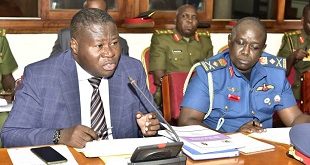
Kampala, Uganda | THE INDEPENDENT | Parliament has started scrutinizing the Leadership Code (Amendment) Bill, 2020.
Introduced in 1992, the Leadership Code Act last amended in 2017 by parliament sets limits on the financial behaviour of public servants, require leaders to declare their incomes, assets and liabilities and put in place enforcement mechanism and other matters.
The proposed new legislation says that a leader shall be taken to have an interest where an income or asset is owned or developed by the leader, jointly owned or developed by the leader with another person, is acquired or developed by the leader for another person and others.
The others are when the income or asset is held in trust by the leader for another person or is contained in a joint account for the benefit of the leader and another person.
This is carried in the Bill presented to Parliament by the Minister of State for Ethics and Integrity, Simon Lokodo.
According to government, one of the defects in the Leadership Code (Amendment) Act passed by Parliament in 2017 is that it refers to a leader having an interest in a property and also refers to proof of ownership of the declared assets which two provisions are just requirements and not breaches yet. The two provisions under the current law attract dismissal from office.
But Minister Lokodo says in the Bill that this and other identified loopholes will jeopardize the effective enforcement of the Act since it is untenable to enforce the law as is without breaches and corresponding penalties.
“Clause 2 of the Bill seeks to amend section 4 of the principal Act to clarify what constitutes an interest in the property by a leader and to provide for breach of the Code where a leader fails to submit a declaration or submits a false declaration. This is aimed at ensuring that leaders do not illicitly enrich themselves,” reads part of the new Bill.
Last year, the former Inspectorate of Government Irene Mulyagonja regretted the 2017 amendment of the law that removed the requirement by leaders to declare wealth of their spouses, children or dependents. The category of targeted leaders ranged from the President, Cabinet Ministers, Civil Servants and Local Council leaders.
Mulyagonja then told the Legal and Parliamentary Affairs Committee that the move meant that illicitly acquired assets can be conveniently registered in the names of spouses, children or dependents of the leaders without question.
The new bill also seeks to require all public officials to declare their income assets and liabilities to the Inspector General of Government.
The current Act mandates persons commencing work in the Public Service after the coming into force of the 2017 amendment Act, to declare their income, assets and liabilities every five years but the proposed amendment requires all public officers to declare their income, assets and liabilities which will provide vital information and evidence in investigating corruption.
Also proposed is to increase the period within which the Inspectorate of Government may undertake verification of a declaration from 60 days to 90days, empower the Leadership Code Tribunal to hear appeals from any person whose application to access a declaration has been rejected by the Inspectorate, extend the jurisdiction of the Leadership Code Tribunal to complaints made by any person aggrieved by a decision of the Inspectorate and others.
Ali Munira, the IGG Spokesperson says that the amendments are intended to further empower the Inspectorate of Government and the Leadership Code Tribunal to enforce the values of integrity and proper conduct in the leadership of the Country.
She says that these values are critical in the pursuit of development, democracy, good governance and the promotion of rule of law. Munira appealed to the legislators to fast track before the declaration period of April 2021.
********
URN
 The Independent Uganda: You get the Truth we Pay the Price
The Independent Uganda: You get the Truth we Pay the Price


